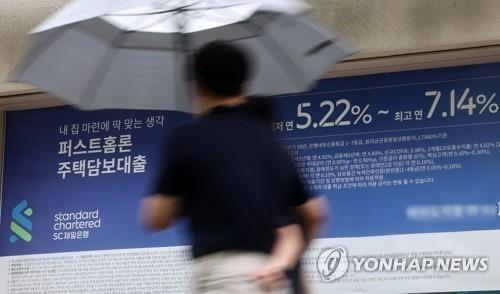- California Assembly OKs highest minimum wage in nation
- S. Korea unveils first graphic cigarette warnings
- US joins with South Korea, Japan in bid to deter North Korea
- LPGA golfer Chun In-gee finally back in action
- S. Korea won’t be top seed in final World Cup qualification round
- US men’s soccer misses 2nd straight Olympics
- US back on track in qualifying with 4-0 win over Guatemala
- High-intensity workout injuries spawn cottage industry
- CDC expands range of Zika mosquitoes into parts of Northeast
- Who knew? ‘The Walking Dead’ is helping families connect
Banks rush to further raise lending rates amid soaring household debts
Major South Korean banks are scurrying to further raise their lending rates, alarmed by a spike in household loans amid extended easing monetary policy, industry sources said Monday.
KB Bank, Shinhan Bank and Hana Bank will raise their lending rates on mortgage loans by between 0.1 percentage point and 0.3 percentage points this week, according to the sources.
They had already conducted a series of hikes in the lending rates on household loans as such loans show no signs of easing in the face of tightened lending criteria.
According to the sources, the country’s top five lenders had already extended 4.18 trillion won (US$3.12 billion) in household loans, mostly home-backed loans, in the first 14 days of this month.
Household loans extended by banks gained 5.5 trillion won in July, rising for the fourth consecutive month, led by a rise in mortgage loan growth, according to central bank data.
Policymakers remained worried over a spike in household debts, which could sap further private spending.
Borrowing costs in Asia’s fourth-largest economy remain high following the BOK’s aggressive monetary tightening aimed at bringing surging inflation under control.
Last month, the central bank held its key interest rate steady at 3.5 percent for the 12th straight time amid moderating inflation and high household debt.
The rate freezes came after the BOK delivered seven consecutive rate hikes from April 2022 to January.
The central bank is widely expected to stand pat this week again.












